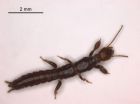RHS finds new insect British type in Wisley glasshouse
What is thought to be the country’s first colony of Aposthonia ceylonica – a species of webspinners - was discovered in the glasshouse at RHS Garden Wisley in Surrey last summer and will now join 24 other insect orders found in the UK.
An order is the umbrella under which relevant families, genera and species sit. Insect orders include beetles (Coleoptera), flies (Diptera), bees, wasps and ants (Hymenoptera), and butterflies and moths (Lepidoptera) with the last new order to Britain – stick insects (Phasmida) - added over 100 years ago.
Webspinners
Webspinners have up to 2.5cm long brown bodies and are the only insects that produce a silk webbing from their front legs, living in tunnels constructed from it to protect themselves from the elements and predators.
They feed on a range of fungal and algal growths, lichen and rotting plant material. The species found by the RHS, Aposthonia ceylonica, is about 1 cm long and lives on the hanging roots of tropical plants like orchids and bromeliads. Their webbing means they can be easily confused for spiders, fungal hyphae or even mealybug secretions and so may be found in other UK plant collections grown under protection.
Webspinners live in colonies and display maternal care of eggs and young, nymphs remaining with the female until they are almost adults. Only adult males are winged and usually the only individuals to leave the webbing. Males however do not feed once they mature and die soon after mating.
Imported via the plant trade
Most webspinners are tropical or subtropical with several species known from warmer temperate regions such as the Mediterranean. They are intolerant to cooler climates and so do not occur naturally in Britain. They are likely to have been imported into the country via the plant trade.
Andrew Salisbury, Principal Entomologist at the Royal Horticultural Society, says: “The confirmation of a new grouping of insects in Britain is evidence of the role that globalisation is and will continue to play on what is found in our gardens. It’s certainly an exciting discovery - if I’d been told I’d one day be adding an entirely new insect order to British fauna I wouldn’t have believed it.”
The RHS
The RHS is fundraising to build the UK’s first National Centre for Horticultural Science & Learning at RHS Garden Wisley which will support the charity’s entomological work.
Help the RHS to protect the future of plants, people and the planet: www.rhs.org.uk

